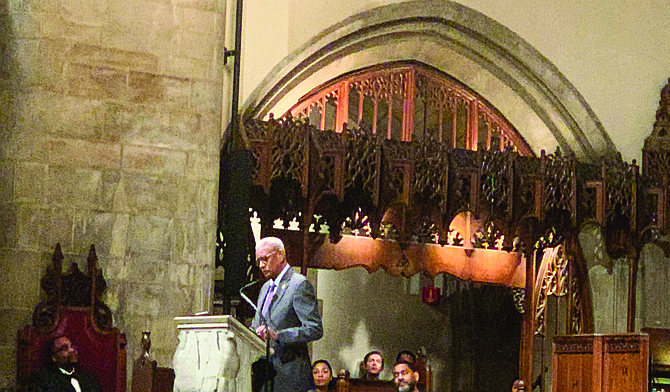LIFE AND LEGACY OF DR. MARTIN LUTHER KING, JR. CELEBRATED AT UNIVERSITY OF CHICAGO
Life and legacy of Dr. Martin Luther King, Jr. celebrated at University of Chicago
BY TIA CAROL JONES
The Rev. Dr. Otis Moss II and the Rev. Dr. Otis Moss III were speakers for the 30th Annual Martin Luther King, Jr. Celebration at the University of Chicago, at Rockefeller Chapel.
The Rev. Dr. Otis Moss III is the pastor at Trinity United Church of Christ in Chicago. The Rev. Dr. Otis Moss II worked alongside King and is a board member and trustee for the Martin Luther King, Jr. Center for Non-Violent Social Change.
Each year, the University of Chicago hosts a commemoration to celebrate Dr. Martin Luther King, Jr. and invites an influential person, or people, to speak. Last year, the Rev. William Barber was the keynote speaker.
Regina Dixon-Reeves, assistant provost at the University of Chicago, said the commemoration is always a special event.
“It allows our entire community - students, faculty, alumni, staff and community residents to come together to reflect on the principles and ideals of Dr. King and to rededicate themselves to working individually and collectively to make our community and world more just,” she said.
Dixon-Reeves said the Rev. Otis Moss II and the Rev. Otis Moss III are a powerhouse duo of speakers. “The Rev. Dr. Moss Jr. and Rev. Dr. Moss III were selected this year for their sustained and generational commitment to civil rights and social justice,” she said. “I believe that the combination of dynamic speakers and the fact that we invite all members of our community to participate makes the event so well attended each year.”
The Rev. Dr. Otis Moss II gave his son a signed copy of Dr. King’s book, “Where Do We Go from Here.”
“I’ve been carrying it around for more than a half century,” Moss II said. “I’m pitching my tent closer and closer to the river.”
The Rev. Dr. Otis Moss III said he was “deeply moved as he passed that book on to me.” He said he remembered seeing the book in his father’s office.
The Rev. Dr. Otis Moss II spoke about historic and prophetic moments in the life of Dr. King.
“In 1929, when Dr. King was born into our nation and the world, our Nation was going through an unprecedented economic crisis … made even more troubling by racism,” Moss II said.
Moss II also made a parallel between Dr. King and Anne Frank, who were both born in 1929. Frank died in a concentration camp at 15. At 15, King was enrolled at Morehouse College in Atlanta, Ga. He said both changed the world and made an impact.
“Whenever you see a child, know that here is a decisive human being and that human being can play a role in saving your life and my life,” he said.
Moss II also talked about Dr. King’s “Letter from Birmingham Jail.” He described it as an epistle and a great work. But he brought attention to another letter King wrote to his wife, Coretta Scott King, when he was jailed in Reedsville State Prison. He talked about the significance of The Kennedy’s working to get King out of jail.
Referring to Presidents Kennedy and Obama, Moss II went on to discuss how King’s imprisonment impacted presidential campaigns for years to come. King, “elected two presidents from a jail cell in Georgia and another president from his grave,” he said. Finally, he talked about watching the news about President Barack Obama’s election.
“It was news that grew out of many dangers, toils and snares,” he said. Moss III also discussed the dignity that filled the White House during President Obama’s two terms in office. “God used a family from the South Side of Chicago to teach a nation if race is a color, it must be Black,” he said. “Maybe the legacy of the Obama years may not be about healthcare and foreign policy, but a national lesson on dignified leadership when dealing with undignified people.”
Moss III added there is an opportunity for people to change someone else’s condition, adding, there is a moral, historic midnight in America and a midnight in the church.
“It must be midnight, midnight in the houses of Worship,” he said. “If we are to be the people we are called to be, we need a church like King and not like Creflo.” He went on to say that together, in unity, “we shall overcome.”
“We will all get together and sing a song,” he said. “In the words of Kendrick Lamar, ‘we gon’ be all right.”
Latest Stories
- Five Things We Learned About Alzheimer’s Disease in 2025
- It’s Better to Be Safe Than Sorry
- ComEd Working To Prepare A Grid For The Quantum Center Arrival
- Local Organization Provides Essentials To Those In Need
- Laboratory Scientist Boasts Being First Black Person in Illinois To Hold A Doctorate In Clinical Laboratory Science
Latest Podcast
Stacy Davis Gates

